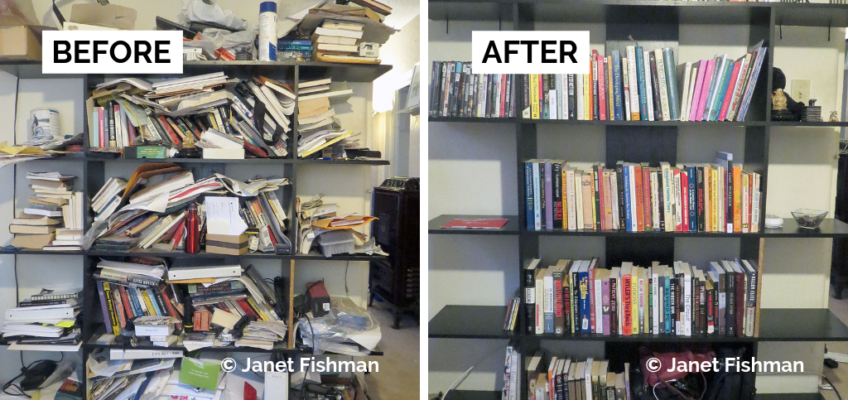Books sit on bookshelves collecting dust for years, yet people do not want to get rid of them. Why are they so attached to their books? People have special relationships with their books.
Here are some of the reasons why it is hard to let go of books:
- Every book gives you a different feeling, and you get carried away by the words on every page. You experience love, excitement, inspiration, and so on. Books evoke certain emotions and good feelings, like a childhood book that parents used to read out loud to you over and over.
- Books represent memories from childhood or graduate school. They are like collections of memories that you hold dear because they have been your companions while you were going through stages in your life.
- They are a source of occasional reference/resource. Whenever you encounter something unfamiliar, you look for that particular book, such as a dictionary, to understand something better.
- Your books resonate with your personality. You develop a sense of who you are from the books that you read. They influence what you like and dislike.
- Books are a window into your mind. They can help you discover something about yourself. They are your source of introspection, help you to self-reflect, allow you to make better decisions, and teach you new things.
- Books are personal. You are taught in school that you need to cover your books, care for your books, not write in them, etc.
- Books are works of art. They are literary masterpieces of your favorite authors, and they should stay on your bookshelves.
It is difficult to think that books can become clutter, but you have to face the truth that they can turn into something that you never intended them to be. When the covers are ruined and pages are missing, do you still want to keep them?
Here are some tips on how to let go of books:
1. If your books are in boxes throughout the house and garage, gather them all into one work area. If your books are all together in a bookcase, start on the very top shelf, in the left corner.
2. Pick up each book and ask yourself if that book is still serving you or has it finished its purpose. If you haven’t looked at the book since grad school 20 years ago, it’s purpose is done, and you don’t need it anymore. A book that old may be too old to donate to any library, school, or organization, but it will depend on the topic and contents.
3. If you are not sure if a book still serves you, ask yourself when the last time you read it was, how often do you re-read it, and do you use it for reference for research. If the answers are all negative, then the book is not serving you anymore. You have permission to donate it.
4. If a book has stopped serving its purpose but you want to remember the memory, take a photo of the cover and the autographed title page and the author’s bio page. Print the image and put the photo in your photo album or save it on your computer.
5. If the book is a classic, remember you can always check it out from a public library or you can go to a kindle-type site and rent it. You don’t need to take up prime real estate space on your bookshelf with books you aren’t using and need the space for other purposes.
6. If the book has strong memories, ask yourself if you can separate the memories or the emotions or the feelings that arise from the physical book. Would recording your feelings in a journal suffice to retain the memory without the physical book? Would seeing a movie or a theatre performance about the book suffice to remind you of the memory without retaining the physical book? One client I helped had shelves of Shakespeare’s books. When I asked him if he re-read these often, he said, “no, I haven’t touched them in 30 years but kept them because they remind me of plays I acted in at college.” When I asked him if he could attend local community theater and watch these plays, would that suffice to allow him to clear off the bookshelves of these books as he desperately needed shelf space, he started to cry and said “yes”. He started attending theatre and revived a passion of his that had been buried for many years.
7. Do you think your quantity of books defines your intelligence? Do you think the more books you have the more intelligent you are? Do you worry that if you give away your books you might lose your intelligence? This was one of my mindsets from my childhood. My schools always had libraries that I used. I always purchased books at the annual Scholastic books sales. My mom always took me to the library. Bookstores were hang-outs. I came to believe that if I surrounded myself with books, then I was smart, but if I gave away any books, I would be giving away my intelligence. This is not true at all. This is an illusion. As I slowly gave away college textbooks due to space constraints, I began to see how this was a big misconception. Then, I was able to give away graduate textbooks. All of this happened before I became an organizer, so when I became an organizer, I had a greater understanding of the emotional tie clients have to their own books. Remember, books do not define you. They can add value to your life, they can contribute to who you are, they can educate you, but they do not define you. Hence, you are free to let them go.
8. Ask yourself how long the book you say you are going to read has been sitting on the shelf waiting for you to pick it up. If more than a few years, then face the reality that you are probably never going to read it. Donate it or create your own outdoor neighborhood free library or club library and share the books with others. Maybe if a friend says they read the book and rave about it, you may become motivated to read it. If your books are themed, you could start a book club or book library for that group…..e.g. books about photography or nature — maybe you belong to a photography group or hiking club and want to share books.
9. Is the material in the book current or out-of-date, like an atlas or encyclopedia? Libraries will not take donations of such materials beyond a certain cut-off date so check with your local library before driving there. If your library is not a resource, you can have your own garage/yard sale or donate the used books that are in good condition to many other places. Below is a suggested list. And, there are many sources that will donate books to foreign countries that welcome reading materials. Those are included in the list below as well.
- thrift stores
- senior centers
- homeless shelters
- battered women’s shelters
- elementary schools for children’s books
- rare book collectors if potentially valuable
- used book stores
- hospitals
- daycare centers for seniors and kids
- doctor waiting rooms
- prisons and jails
- Better World Books
- Biblio Sans Frontieres.org
- Book Aid International
- Bookfriends International, NFP (AFRICA)
- Books for Africa
- Books for All
- Bridge to Asia
- Brother’s Brother Foundation
- Child Aid
- Children’s Book Project
- Darien Book Aid Plan, Inc.
- Donationtown.org
- HJH Libraries for All Program
- International Book Bank
- Milk + Bookies, formerly Bookends
- REFORMA Children in Crisis Project
- The African Library Project
- The Asia Foundation
10. Once you purge the books you don’t want, then organize the books you want to retain. You can organize them by topic, by author, by business and personal, etc. Organize the tallest books to the far left of the shelf and then continue height-wise down across the shelf. Pull the books all the ways to the front of the shelf. Use a bookend to hold up the books if there is open space at the end of the shelf. If you can keep the books in a bookcase that has closed glass doors that will better protect the paper from the elements – dust, bugs, temperature changes, etc.
After this process, you might feel overwhelmed, but that is okay. Praise yourself for your accomplishment. Be happy that you were able to tackle this massive project. If for some reason, you find this task daunting, ask someone to help you, such as a friend or Professional Organizer. As we were taught in school, books are our friends. Doing this decluttering does not mean that you are going to stop buying books or reading books. Just the contrary. You will now feel freer to resume reading – you just may do it on a device like a kindle, listen to books on tape, check books out from a library, or borrow from a friend.

